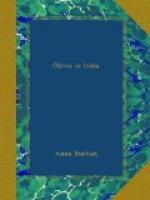Chowringhee faces the Maidan, a very large park containing among other things a race-course, and cricket and football grounds. The word Maidan is Arabic and Persian and Hindustani for an open space, and I hope you like the superior way I explain things to you. You, who can be silent in so many languages, will probably know what Maidan means—but no matter.
This, then, is the European Calcutta, clean and spacious and pleasant, but not nearly so interesting as the native part. Turn down a side street, walk a little way and you are in a nest of mean streets, unpaved, dirty, smelling vilely, lined with open booths, where squat half-naked men selling lumps of sticky sweetmeats and piles of things that look like unbaked scones and other strange eatables; and little naked babies tumble in the dust with goats and puppies. It seems to me that I go about asking “Why?” all day and no one gives me a satisfactory answer to anything. Why, for example, should we require a troop of servants living, as we do, in a kind of hotel? And yet there they are—Boggley’s bearer and my ayah—I can see some reason for their presence—a kitmutgar to wait on us at table and bring tea in the afternoon, another young assistant kitmutgar who scurries like a frightened rabbit at my approach, a delightful small boy who rejoices in the name of pani-wallah, whose sole duty is to carry water for the baths, the dhobi who washes our clothes by beating them between two large—and I should say, judging by the state of the clothes, sharp—stones, losing most of them in the process, and a syce or groom for each pony. Seated, as one sometimes sees them, in rows on the steps, augmented by a chuprassi or two, brilliant in uniform they make a sufficiently imposing spectacle. I have few words, but I look at them in as pleasant a way as I know how, partly because I like to be friends with servants, and partly




